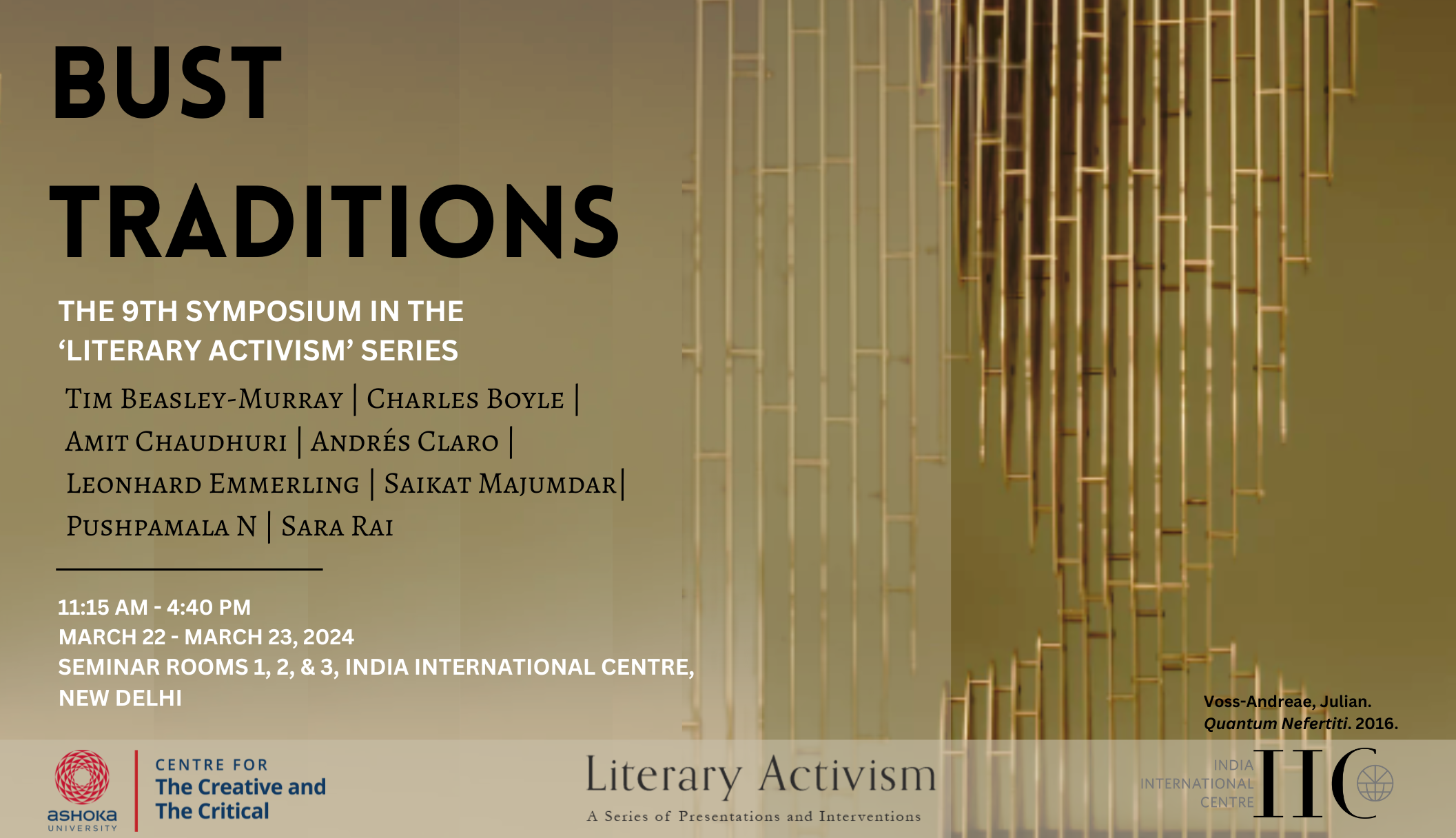

The Centre for the Creative and the Critical, Ashoka University, in partnership with the India International Centre, Delhi, invites you to the 9th symposium in the Literary Activism series on Friday 22nd and Saturday 23rd March, from 11.15 am to 4.40 pm.
The subject is ‘bust traditions’. (For more on this, see the mission statement below.)
The symposium will take place at the India International Centre, New Delhi, in Seminar rooms 1, 2, and 3. It’s open to all.
As has been the case since December 2014, when these symposia began, we’re making space for a conversation usually unavailable at academic conferences and book launches.
The speakers, in alphabetical order, are
Schedule
22nd March 2024
11:15 am
Opening Remarks
11:30 am to 12:30 pm
Andrés Claro: ‘Genealogies of Failure: Three Traits of the Southern Cone Literary Ethos’
12:40 pm to 1:40 pm
Pushpamala N: ‘The Bust Archive’
1:40 pm to 2:30 pm
LUNCH
2:30 pm to 3:30 pm
Amit Chaudhuri: ‘From Bolaño to Calcutta: The Bengal Renaissance as a “Bust” Renaissance’
3:40 pm to 4:40 pm
Leonhard Emmerling: ‘On the Powerlessness of Art’
23rd March 2024
11:30 am to 12:30 pm
Tim Beasley-Murray: ‘Bolaño, Bustness, and Literary Activism’
12:40 pm to 1:40 pm
Sara Rai: ‘Finding a Form: The Fiction of Naiyer Masud’
1:40 pm to 2:30 pm
LUNCH
2:30 pm to 3:30 pm
Charles Boyle: ‘Bust Writers, Bust Publishers’
3:40 pm to 4:40 pm
Saikat Majumdar: ‘The Bust Tradition of Criticism as Art’
Bust Traditions: Mission Statement
In relation to the Latin American boom of the 1980s, Roberto Bolaño, a writer from the generation after Gabriel Garcia Marquez, evidently identified himself as a ‘bust’ writer. That boom, of course, became largely responsible for the ascendancy of the novel as a literary form at the end of the twentieth century. With the ascendancy came the privileging of certain characteristics associated with the novel: narrative and completeness. Poetry in the period of modernity hadto irrevocably situate itself in bust: it was fragmentary, formally untotalising, and could neither represent reality nor communicate meaning in any way that was commonly accepted. Poetry indeed went bust in the 1990s, the decade of the global boom.
Bolaño spent most of his writing career in relative obscurity, presumably in the sort of semi-concealed cultural milieu he describes in some of his stories: the world of meeting-places and little magazines, of dissemination rather than publishing in the contemporary sense. By ‘dissemination’ I mean a (worldwide) cultural network through which styles and ideas spread inexplicably from one seemingly isolated locality to another, without any overt apparatus making this possible, unlike today’s publishing machinery, which ensures a careful selection of books reaches us. After his death at the age of 50 in 2003, Bolaño’s work got picked up by this primarily Anglophone machinery, and began to be propagated in the familiar post-globalisation manner, and annulled: that is, whatever might have been living and bust in his work went bust. Nothing opened up. The boom claimed to go on booming, as it did after the 2008 crash. Yet Bolaño’s writing is of interest primarily because in him we have a figure whose eccentric history we do our best to ignore as we read him. His work is domiciled in ‘global literary fiction’. When he claimed he belonged to the bust tradition, he implicitly drew our attention to the fact that this might be a desirable place to be in. And he hinted at the existence of a lineage. Who might be the figureheads of this variant of bust? Jorge Luis Borges, certainly; maybe Pessoa too. There must be others: only recently I discovered Julio Raymón Ribeyro through an essay by Antonio Muñoz Molina translated for literaryactivism.com by Pankaj Mishra. Ribeyro, in a diary note, describes the boom and its literary monuments in these terms: ‘heteroclite, ornate, monstrous palaces’.
Other continents and countries have had their boom. India became essential to one in the early nineteenth century; the scholar of Romanticism Nigel Leask quotes Byron’s advice to Thomas Moore: ‘Stick to the Orient. It’s the only poetical policy.’ Light of Asia (1879), a biography in verse of the Buddha, was a bestseller and remunerative marvel for its author Edwin Arnold; Matthew Arnold was bemused to find himself mistaken, during a visit to America, for the far more famous Edwin; he was, as the wrong Arnold, even mobbed by adorers. Tagore’s English Gitanjali represents an early twentieth-century boom; after 1981 and Midnight’s Children, there is the boom phenomenon of the Indian novel in English. It’s the climate in which I began to write, and it eventually made me understand my relationship to bust, and that I must try to make my own tradition. That tradition is literature, which I have, over the last three decades, been constantly looking at again. Literary traditions – like Matthew Arnold and the Tagore of the Bengali lyric – have always been bust. The modern literatures in the Indian languages that emerged in the nineteenth century – disjointed, world-connected projects – are (as opposed to a national literature) compelling instances of bust traditions.
How do we address these histories, find a place for idle daydreams in our world, and arrive at a conceptual alternative to the boom? The 2008 crash and the pandemic both confirm that calamity nourishes the boom rather than weakening it. Is the bust really over?
Amit Chaudhuri